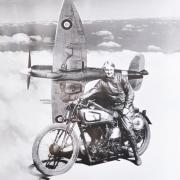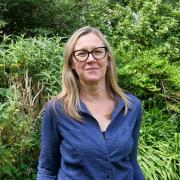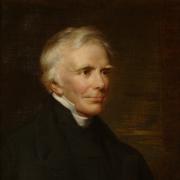Fortunes of War writer, Olivia Manning may be Portsmouth’s most underrated author

‘Authoress of Fortunes of War – born here 2 March 1908’. If there was a blue plaque to Olivia Manning in the North End of Portsmouth, it would probably say something like that. Sadly, there isn’t. That doesn’t mean, however, that there aren’t places around the city that can connect us to this literary heavyweight, who should be far better known than she is.
That ‘North End’ was derived from the place’s origin as a northern expansion of Kingston, its north end no less. Today, it is a predominantly residential area in the midst of Portsea Island, which grew rapidly from being on a horse-drawn tram route, connecting Portsmouth with Cosham. Comprising primarily late-19th to early-20th century housing stock, it would have been in just such a dwelling that Olivia Manning was born.
There are places in the city that link directly with Olivia. Take Victoria Park, for example, where the future authoress pored over books borrowed from the public library, forming the ideas that evolved into her novels. It is a place of peace and tranquillity even today and it is easy to imagine how it might have inspired Olivia in an earlier, less hurried era. And then there’s a building of today’s University, but formerly both the public library, from where she obtained her precious books, and the municipal college, that she also attended. The University actually dates to 1908, the year of Olivia’s birth, when the ‘Park building’ opened as the college and library. Perhaps this would be a suitable home for that blue plaque?
If not the college, then back in North End, one of the residential roads is Laburnum Grove, a thoroughfare which includes ‘the house of Olivia Manning’s youth’ and is therefore also a prime candidate for that plaque.

Given this is a long, straight road of residences, it fits with Olivia’s own description of the street where she was born as the ‘longest, dreariest avenue in England’. A little harsh, but then someone did once dub the authoress ‘Olivia Moaning’: her career as a novelist often dominated by her complaints about her lack of standing in the literary world.
Olivia’s Dad, Oliver Manning, was a naval officer, who’d risen from humble origins. It was when visiting Belfast, in 1904, that he met publican’s daughter Olivia Morrow, 14 years his junior. They married within a month, in December 1904.
When Olivia was born just over three years later, she was named after her mother. Olivia seems to have been a ‘Daddy’s Girl’, a tendency that was amplified after her brother, Oliver, was born in 1913.
A sickly lad, his mother’s fussing over him served to alienate a marginalised Olivia. It seems that Olivia, in a fit of pique, even tried hurting her sibling on more than one occasion. It amounted to a childhood that began rosily, but turned sour, an experience that made a lasting impression on her life and work.

With her Dad often at sea, Olivia’s education was peripatetic, sometimes occurring in Ireland but also in Portsmouth, including Lyndon House School, and Portsmouth Grammar.
She developed a sense of not belonging anywhere, which influenced her writing. She did get into reading young though, although her mother discouraged this, judging that skills such as typing would be more useful.
She was also a talented artist, undertaking evening classes at the Portsmouth Municipal School of Art and even having a picture selected for an exhibition at Southsea. By the age of 20, however, Olivia’s mind was fixed – she would be a writer.
Olivia’s first steps towards literary fame occurred in her home city. She had three serialised crime novels published in the Portsmouth News, starting in 1929, and adopted a suitable pseudonym, ‘Jacob Morrow’.
Manning would not finally acknowledge these works as hers until the 1960s. For the budding writer, Portsmouth now felt restrictive, and Manning took flight in 1934, heading for London’s bright lights. She was in her mid-20s by this time.
Although she left Portsmouth behind, Manning’s home city inspired at least one of her novels, The Play Room (1969), which is set in ‘North Camperlea’, a fictional version of North End. Here, Manning’s young heroine unloads her own youthful frustrations as she aspires to swap something dreary and run-down for the gaiety of London. It’s a ‘coming of age’ tale with a father figure based on her own Dad.
Olivia carved a niche for herself as a serious author, who ambitiously attempted to depict the panorama of modern history, but within the framework of a fictional setting. Her first novel, in her own name, was The Wind Changes (1937), a couple of years before her marriage to R.D. (Reginald Donald) Smith, who had literary pretensions of his own. After the war, Manning published School for Love (1951), the tale of a 16-year-old lad in a war-scarred Jerusalem.
Olivia’s ‘Magnum Opus’, however, was her Balkan Trilogy, published in three parts between 1960 and 1965. It’s the story of Guy Pringle and his wife Harriet and is set in the Balkans, that powder-keg of south-eastern Europe, as WW2 gets underway. As the first book opens, the Germans are advancing into Poland and the couple have been married less than a week, having only met a month ago (this sounds like the story of Olivia’s parents). Olivia’s husband, who it has been mooted may have been a spy, probably inspired the character of ‘Guy’. The tale feels semi-autobiographical.
As if that wasn’t sufficient, another trilogy followed, A Levant Trilogy, the ‘Levant’ referring to the area of the Eastern Mediterranean synonymous with the Holy Land. The two trilogies are known collectively as Fortunes of War.
The final part of A Levant Trilogy was published posthumously, for Manning suffered a stroke, early in July 1980, while visiting friends on the Isle of Wight, and died in hospital in Ryde, on the 23rd. Her ashes were scattered on the island, at Billingham Manor in Chillerton.
Olivia moaned about her lack of recognition and seems to have had a point. It was only when Fortunes of War was adapted for television in 1987 that posthumous fame came her way. She reportedly said, “I don’t want fame when I’m dead,” but this seems to be what she got.
As far as her writing is concerned, however, she remains ‘underrated and underread’. Perhaps Portsmouth should consider that blue plaque. It feels overdue.



























